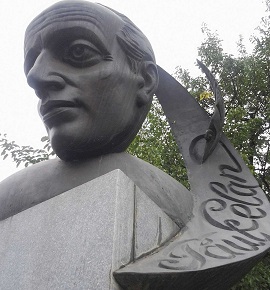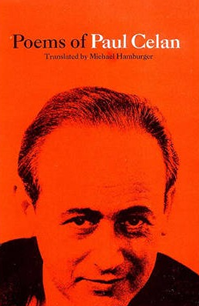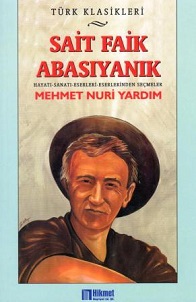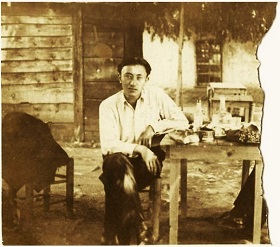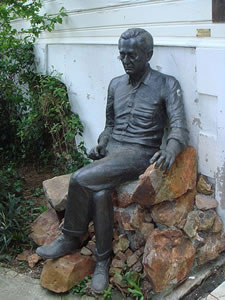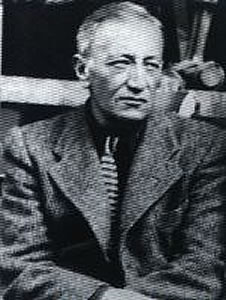De Duits-Roemeense dichter Paul Celan werd onder de naam Paul Antschel op 23 november 1920 geboren in Czernowitz, toentertijd de hoofdstad van de Roemeense Boekovina, nu behorend bij de Oekraïne. Zie ook mijn blog van 23 november 2006 en mijn blog van 29 maart 2006 en ook mijn blog van 23 november 2007.
Auch heute abend
Voller,
da Schnee auch auf dieses
sommerdurchschwommene Meer fiel,
blüht das Eis in den Körben,
die du zur Stadt trägst.
Sand
heischst du dafür,
denn die letzte
Rose daheim
will auch heute abend gespeist sein
aus rieselnder Stunde.
Wo Eis ist
Wo Eis ist, ist Kühle für zwei.
Für zwei: so ließ ich dich kommen.
Ein Hauch wie von Feuer war um dich –
Du kamst von der Rose her.
Ich fragte: Wie hieß man dich dort?
Du nanntest ihn mir, jenen Namen:
ein Schein wie von Asche lag drauf –
Von der Rose her kamst du.
Wo Eis ist, ist Kühle für zwei:
ich gab dir den Doppelnamen.
Du schlugst dein Aug auf darunter –
Ein Glanz lag über der Wuhne.
Nun schließ ich, so sprach ich, das meine – :
Nimm dieses Wort – mein Auge redet’s dem deinen!
Nimm es, sprich es mir nach,
sprich es mir nach, sprich es langsam,
sprich’s langsam, zögr es hinaus,
und dein Aug – halt es offen so lang noch!
ER ZAL iets zijn, later,
dat vult zich met jou
en stijgt op
naar een mond.
Uit de stukgeslagen
waan
sta ik op
en kijk naar mijn hand,
hoe die de ene
enige
kring trekt.
Vertaald door Frans Roumen
Paul Celan (23 november 1920 – 20 april 1970)
De Amerikaanse dichteres en schrijfster Jennifer Michael Hecht werd geboren op 23 november 1965 in New York. Zie ook mijn blog van 23 november 2006.
My Guy
Oh little fishy. You, you brought the bottle
green tint to the world, the blue bauble glint.
Young and in love. This is a legacy that
has it on mud and lumber, oh yes,
that breathes through its blue glass bones.
Easy fella. In a flatbed Ford, a coaster
on rollers, a cloudy August afternoon.
They are out on errands and everything
is quiet. I must chase the golden fish away
to rhapsodize about him, little fish.
The guy has my eyes. Keen canoodling,
Zen commanding. Ken kaput. Fair of cheek,
huge of foot. Can not yet be tickled.
Zoo Review
To begin is to let things out of control.
The park’s caged condor stumbles to the fore.
The mind can not be told what it does not know.
Let us begin by calling a massive bird a soul;
each wing wide as the height of a man or more.
To begin is to help things out of control
with a clasp of fence in beak and a forceful fold
of what was given, then out the rifted door.
The mind must graze what it can not hold.
If the population of the park took up a goal
of leaving, it wouldn’t stop to wonder where to go.
To begin is to chase thoughts out of control.
Likewise, as love and birth have come to show,
much can not be seen before we are ashore
where minds find what, at sea, they did not know.
The bird adjusts its shoulder-feathers like a stole,
a bristling cape, a heft of flight, a height left low.
To begin is to let things out of control.
The mind can not be told what it does not know.
Jennifer Michael Hecht (New York, 23 november 1965)
De Duitse dichter, schrijver en essayist Marcel Beyer werd op 23 november 1965 in Tailfingen / Württemberg geboren. Zie ook mijn blog van 23 november 2006.
Uit: Kaltenburg
“Ludwig Kaltenburg wartet bis zu seinem Tod im Februar 1989 auf die Rückkehr der Dohlen. Besuchern gegenüber äußert er sich noch in seinem letzten Winter zuversichtlich, eines Tages werde ein Paar dieser von ihm geliebten, von ihm bewunderten weißäugigen Krähenvögel den Kamin im Arbeitszimmer als Nistplatz wählen und mit seiner Brut eine neue Dohlenkolonie ins Leben rufen. »Ich weiß, sie werden erst in einigen Monaten mit dem Nestbau beginnen«, erklärt er Weggefährten, Schülern oder Journalisten, die von Wien eine knappe Autostunde durch die niederösterreichische Schneelandschaft gefahren sind. Ihm stehe die Zukunft vor Augen. In eine Wolldecke gehüllt, sitzt der große Zoologe Ludwig Kaltenburg am Fenster, das Karomuster und das volle weiße Haar, er hört nur noch sehr schlecht, seine Geistesgegenwart aber hat nicht gelitten.
»Die Vögel fliehen den Rauch«, sagt er, darum halte er es nicht für ratsam, den Ofen in dem kleinen Anbau vom frühen Morgen bis in die Abendstunden brennen zu lassen. Der späte Kaltenburg wird von mehreren elektrischen Heizöfchen eingerahmt. Er ist gelöster Stimmung. »Die jungen Dohlen werden ohne mich zurechtkommen müssen, dessen bin ich mir durchaus bewußt.«
Ehe die Gäste höflich protestieren können, der hochverehrte Herr Professor werde sie am Ende alle überleben, schildert Kaltenburg den Abstieg einer sogenannten Kamindohle zu ihrem in völliger Dunkelheit liegenden Nest. Der Vogel springt nach einigem Zögern und Herumlaufen mit dem Schnabel voran in den Eingang der künstlichen Höhle, vollführt eine Drehung, findet mit abgespreizten Flügeln am rauhen Kamingemäuer Halt, streckt die Beine aus und stützt sich mit den Krallen ab. Dann geht es vorsichtig, man könnte sagen: Schritt für Schritt, hinunter in die Tiefe, zwei Meter oder mehr. Das laute Poltern, Rasseln, Schleifen. Momentaufnahmen dieser viele Male am Tag wiederholten Prozedur vermitteln den Eindruck, die Dohle stürze hilflos aus großer Höhe herab, aber das Gegenteil ist der Fall, jede Bewegung zeugt
von überlegtem Vorgehen und äußerster Geschicklichkeit ».
Marcel Beyer (Tailfingen, 23 november 1965)
De Turkse schrijver Sait Faik Abasıyanık werd geboren op 23 november 1906 in Adapazarı. Toen Griekse troepen de stad innamen vluchtte zijn familie naar Bolu en na de oorlog trok zij naar Istanbul, waar Sait Faik het gymnasium bezocht. Dit maakte hij af in Bursa. Hij studeerde vervolgens tot 1930 literatuurwetenschappen in Istanbul. In de jaren 1931 – 1935 verbleef hij in Frankrijk, waar hij in Grenoble nog twee jaar literatuur studeerde. Hij werd door zijn vader teruggeroepen naar Turkije om een beroep te gaan uitoefenen, werkte als leraar, handelaar en tenslotte als correspondent bij het gerechtshof. Sait Faik schreef twee romans en talrijke korte verhalen. Hij was het die het moderne korte verhaal in Turkije introduceerde. Zijn verhalen gaan over het stadse leven van vissers, kroeglopers, matrozen, scheepspassagiers, straatvergers, postbodes, Armeniërs, joden en straatmuzikanten. Istanbul of de eilanden in de regio zijn de plaatsen waar het zich allemaal afspeelt.
Uit: Simit with Tea (Vertaald door Hatice Orun Ozturk)
“I would’ve liked to add “aged cheese” to this heading but it is better that I don’t because next to the companionship of simit and tea, it fades away to the background. We do have days when we have both simit and tea but the three of them?…Maybe I should’ve separated tea from simit too. Only simit, that delicious man made fruit of the morning should have been my topic. But what can you do? I couldn’t bear to leave out the tea. Although tea is secondary to simit, their companionship nevertheless is a genuine one. No breakfast can take the place of simit with tea! If a person eats a breakfast of butter, preserves, honey and even grapefruit but doesn’t leave his house in a car, one should get upset with him. After a breakfast like that, you must hop into a car without getting your shoes wet. Sitting in your fancy office chair without any mud on your shoes you must start a phone call:
-“Just like I said last night. Not a dime less.” You must hang up the phone and start
another call:
– “How is the stock market? Did you say 76.20 ? Don’t sell, wait. I am telling you to wait. Obviously I know something. I won’t sell for 77 either. Not a dime less than 80. OK I am waiting. If I don’t hear from you by noon, I may change my mind. Mark my words….” You must say.
However, after drinking tea with simit, we can walk on the muddy streets and with sesame seeds still between our teeth, we can run from place to place. It rains as we run, sweat drips down our foreheads. With sesame seeds between our teeth, we can still smell the morning tea. When will the day end? When will we finish the pile of paper in front of us and lay down in our beds and get some rest? See, it is morning again! Acem Hasan Efendi must have brewed the tea. Where is this dimwitted simit seller? He comes and sells us the simit from yesterday, or he doesn’t come and the tea loses its taste.”

Sait Faik Abasıyanık (23 november 1906 – 11 mei 1954)
De Amerikaanse schrijver, vertaler, schilder, illustrator Guy Mattison Davenport werd geboren op 23 november 1927 in Anderson, South Carolina. Van 1948 tot 1950 was hij een “Rhodes Scholar”aan het Merton College in Oxford, waar hij Oude Engelse literatuur studeerde bij J. R. R. Tolkien. Hij schreef er Oxford’s eertse scriptie over James Joyce. Na zijn terugkeer in de VS diende hij twee jaar in het leger, doceerde twee jaar aan de Washington University in St. Louis tot 1955, toen hij een studie in Harvard begon. Zijn dissertatie schreef hij over de dichter Ezra Pound, die hij ook persdoonlijk kende. Het werk verscheen onder de titel Cities on Hills in 1983. Tot 1990 doceerde Davenport aan de universiteit van Kentucky. Een MacArthur Fellowship stelde hem in staat vroegtijdig met pensien te gaan. Davenport debuteerde met fictief werk in 1970 toen “The Aeroplanes at Brescia” verscheen, gebaseerd op een bezoek van Franz Kafka aan een vliegshow in september 1909. Naast fictie schreef hij meer dan vierhonderd essays, artikele, introducties, recensies, twee boeken over kunst en een handvol gedichten.
Uit: Tatlin (six stories)
“Dat gaat te ver, they heard Erika say.
The dull iron mountains beyond which stretch the lava fields of the Palus Somnii and the mercurial black hills and dismal quarries of the Mare tranquilllitatis take the dawn of the moon’s sixth day on their garnet peaks, then as a feathery limelight on the spines of their gullies, and hold in their piedmont rubble a coral of lightning.
A hand on a sandy thigh, drone of the sea, unending kiss. Ook aan de langste zomerdag komt een einde.
Across the white bones of the rim of Atlas, silent from the storms of fiery rock at the moon’s birth to the holocaust of time, steel light as if flashed from tungsten strikes next the mountain, dolomite and terrible, in the crater’s desolate midst, and next, above black valleys of shadow, the sooty promontories of Hercules, and spreads on to the dead stone rings of Aristotle and Eudoxus.”
Guy Davenport (23 november 1927 – 4 januari 2005)
De Schotse schrijver en historicus Nigel Tranter werd geboren op 23 november 1909 in Glasgow en volgde een opleiding aan George Heriot’s School in Edinburgh. Hij had een opleing als boehouder en werkte bij een verzekeringsbedrijf. Vanaf zijn jeugd had hij grote belangstelling voor kastelen. In 1935 verscheen zijn eerste boek over dit onderwerp. Tussen 1962 en 1971 verscheen in vijf delen The Fortified House in Scotland. Tijdens het schrijven van deze werken realiseerde Tranter zich dat er veel gebeurtenissen en personen in de Schotse geschiedenis waren die stof zouden kunnen zijn voor romans. The Queen’s Grace (1953) was zijn eerste roman over een historisch onderwerp. De MacGregor Trilogy (1957-1962) en de Master of Gray Trilogy (1961-1965) volgden. Tranter werd van toen af beschouwd als een schrijver van serieuze historische fictie.
Uit: The Bruce Trilogy
“His information that Comyn would he in town today was quickly confirmed. He learned that his enemy, who was much involved in this bout of litigation, had installed himself at the small monastery of the Franciscan or Grey Friars, founded by the Lady Devorgilla, Balliol’s mother, in the Castle Wynd, conveniently close to the castle itself. Here Bruce sought him-to learn that his quarry was at present attending the court nearby, but would be back. Bruce declared grimly that he would wait.
He had with him his brothers Nigel and Thomas, and his new brother-in- law Sir Christopher Seton, whom Christian of Mar had recently married. As Bruce anticipated, the news that he was back in Scotland and in fact here in Dumfries, very speedily was conveyed to Comyn in the castle, who promptly found his business there insufficiently vital to detain him from coming to verify the matter.
With a party of relatives and supporters he arrived at the monastery, and even though warned, the sight of Bruce sitting waiting for him before the fire of the refectory undoubtedly perturbed him. He stared.
“I had not looked to see you, my lord. Back. Here in Scotland,” he jerked. “So soon.” “No? I warrant you did not! But I am here. Safe and in order.” Bruce’s voice may have sounded steady enough, but only iron control hid the quivering tension that had been part of the man since the fact of Comyn’s treachery had struck him four days before.
“You come from London? From Edward?” “From Edward, yes. That surprises you?”
“Only that you are not long gone. To return so soon. Comyn shrugged. “You saw the King? Spoke with him?”
“I did.”
The other obviously was nonplussed. “He treated you kindly?”
“Not kindly, no. Edward is seldom kind to Scots.”
“Did he speak … of me?”
“What he said is for your privy ear, my lord.”
“Ah, yes. To be sure.” Comyn looked around him at all the interested throng of his own supporters and Bruce’s, filling the small refectory. He beckoned to the Prior, who fussed about, in a flutter with all this splendid company. “Where may I speak alone with my lord of Carrick?” he demanded.”
Nigel Tranter (23 november 1909 – 9 januari 2000)
De Bengaals-Indische schrijver Nirad C. Chaudhuri werd geboren op 23 november 1897 in Kishoreganj. Hij studeerde met lof af aan de universiteit van Calcutta (nu Kolkata) en begon een loopbaan als klerk in het Indische leger. In dezelfde tijd begon hij artikelen te schrijven voor populaire tijdschriften. Hij richtte er ook zelf twee op, maar die waren geen lang leven beschoren. In 1938 werd hij secretaris van de politicus Sarat Chandra Bose. Daardoor kwam hij in contact met beroemdheden als Mahatma Gandhi en Jawaharlal Nehru. Zijn meesterwerken, The Autobiography of an Unknown Indian uit 1951 en The Continent of Circe uit 1965 maakten hem tot een van de grote Indisch-Engelse schrijvers.
Uit: Three Horsemen Of The New Apocalypse
“Another natural inclination of Nehru’s, which was created by his entire upbringing and education by an English tutor at home, and at Harrow and Cambridge later, was that he would not employ anybody who was not educated abroad, especially at Cambridge or Oxford. As all Indians so educated were, as a class, pure opportunists who only pursued self-interest, he got a whole cohort of them round himself.
His political colleagues he was compelled to accept as
the unavoidable company imposed on him by the new universal franchise. But he would not accept them as fellow-workers. He got together those who were educated abroad. This made him select as his highest adviser on foreign policy Sir Girija Shanker Bajpai, a member of the Indian Civil Service, who under the British had carried on active propaganda against the Congress in the United States. But at least he was a decent and refined opportunist. Most of the others whom he selected for important jobs were maldodorus like skunks. Thus India under the Nehru government was like castles in Spain resting on kitchens, if not sewers.
I assumed that this unnatural government could not last in India and the power of the Anglicised Indian would disappear with Nehru’s death, which in any case could not be far distant. At that time I was asked by a very important journal in India to write an article on the question: ‘After Nehru, What?’ was the crucial question and not ‘Who’. My assumption did not prove to be correct. The dictatorship of the Nehru dynasty continued with short interruptions, which were like the ‘accidentals’ in a musical composition. The normal key was quickly restored.”
Nirad C. Chaudhuri (23 november 1897 – 1 augustus 1999)
De Duitse schrijfster Marieluise Fleißer werd geboren op 23 november 1901 in Ingolstadt. Vanaf 1919 studeerde zij in München Duits en theaterwetenschappen. Daarna leefde zij als zelfstandig schrijfster in Berlijn. In 1935 kreeg zij een schrijfvervod en keerde naar Ingolstadt terug. Na 1945 begon zij weer met schrijven. In 1929 werd haar stuk Pioniere in Ingolstadt voor het eerst opgevoerd, onder de regie van Bertolt Brecht. Het werd een schandaal, doordat Brecht het stuk geradicaliseerd had. Op het toneel werd een ontmaagding in getoond. Fleißer werd persona non grata in haar eigen stad. Vanaf 1950 ontving zij enkele literaire prijzen, waaronder de Bayerische Poetentaler. Eind jaren zestig werd zij herontdekt, om te beginnen door Rainer Werner Fassbinder. Sinds 1981 bestaat er een Marieluise-Fleißer-Preis, verleend door de stad Ingolstadt.
Uit: Marieluise Fleißer. Leben im Spagat.(Samengesteld door Elfi Hartenstein)
“Ich schaue mein Stück an, ich schaue Ihren Protest an – ich kann mir nicht helfen, Herr Oberbürgermeister, ich bringe die beiden Dinge nicht unter einen Hut. Faktisch habe ich doch eine Riesenreklame für meine Vaterstadt gemacht, und ich habe sie gerne gemacht, da ich eine begeisterte Ingolstädterin bin. Sie sind mir da wirklich etwas in den Rücken gefallen. (…)
Aus Ingolstadt schrieb man mir sogar, daß man mich dort totschlagen würde. Seid doch nicht gleich so derb, liebe Leute. Da hätte ich ja, wenn es nach euch ginge, in meinem Stück ganz anders derb sein müssen, um den volkstümlichen Ton zu treffen, mir macht das Kummer. Es ist nicht fein, wenn man ein Mädchen totschlägt. Es ist auch dann noch nicht fein, wenn dies Mädchen zufällig in Berlin aufgeführt wird. Die Mädchen genießen heute größere Freiheit. Wir leben nicht mehr im Zeitalter der Hexenprozesse. ….”
Offener Brief an den Oberbürgermeister von Ingolstadt, Berliner Tageblatt, 17 April 1929″
Marieluise Fleißer (23 november 1901 – 2 februari 1974)
